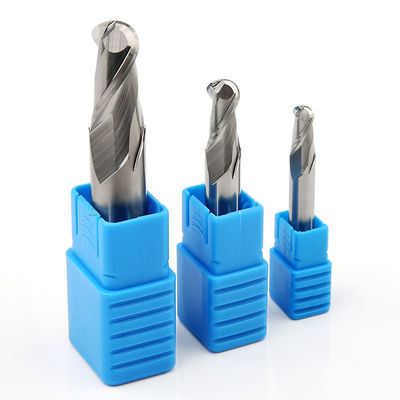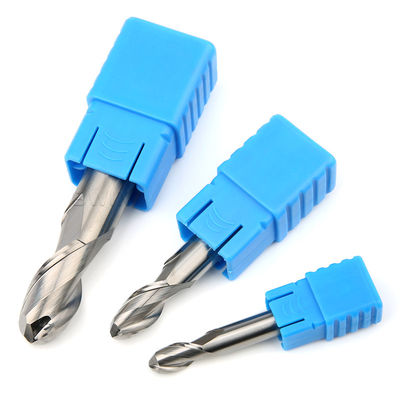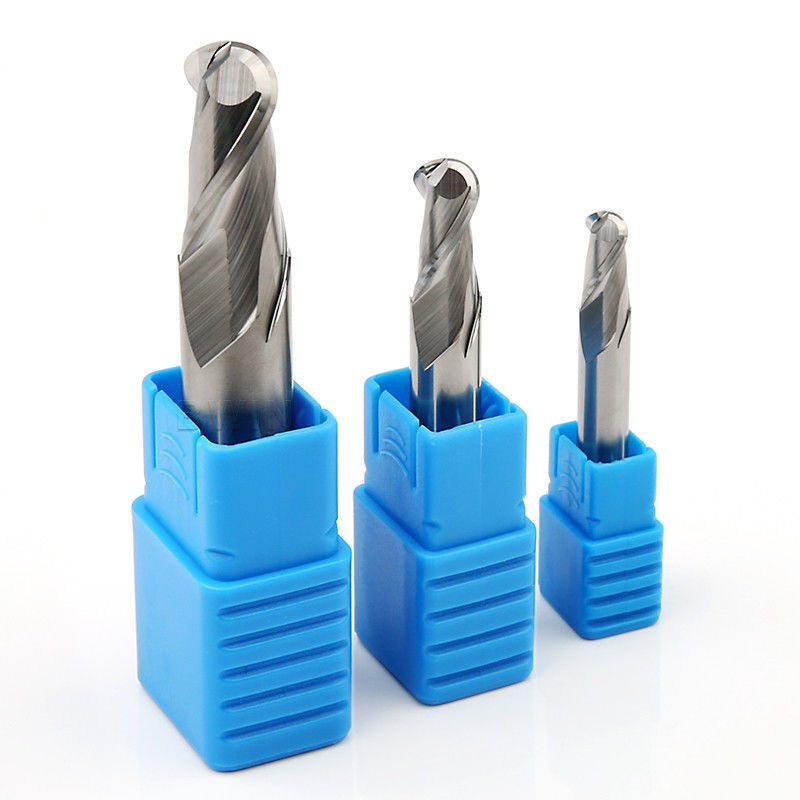2 Flute Carbide Ball Nose End Mill HRC45 Endmill Ballnose For Aluminum
Product Details:
| Place of Origin: | China |
| Brand Name: | BWIN |
| Model Number: | R2*8*d4*100L-2F HRC45 |
Payment & Shipping Terms:
| Minimum Order Quantity: | 1pcs/box |
|---|---|
| Price: | Negotiable |
| Packaging Details: | Plastic box |
| Delivery Time: | 7 work days |
| Payment Terms: | T/T, Western Union |
| Supply Ability: | 1-10000pcs 7days |
|
Detail Information |
|||
| Product Name: | Aluminum Endmill Ballnose | Model: | HRC45 2 Flutes Carbide Ball Nose End Mill |
|---|---|---|---|
| Material: | Carbide Aluminum Ball Nose Milling Cutter | Workpiece: | Alloy Steel |
| Usage: | Milling | Coating: | AlTiN |
| HRC: | HRC45 | Feature: | High Strength Cutting Edge |
| Application: | CNC Machine | Package: | 1pcs/Box |
| Highlight: | Ball Nose End Mill For Aluminum,HRC45 Endmill Ballnose,2 Flute Carbide Ball Nose End Mill |
||
Product Description
Characteristic:
- High quality tungsten steel base metal
- Imported grinding machine technology
- Sharp and firm
- Anti-seismic and wear-resistant
- Stable performance
Description:
- The HRC45 2F aluminum ball nose milling cutter is forged with 0.4um micro-grained tungsten steel raw material, which has higher wear resistance and strength, and refuses to break the cutter. It is a special milling cutter for high hardness and high-speed cutting applications; German high-temperature resistant nano-coating technology can effectively improve the surface finish of the cutting part of the cemented carbide milling cutter, reduce the resistance when the chips form curls, and improve the wear resistance and service performance of the milling cutter; The design of large chip removal groove and large spiral chip removal groove at the edge can remove chips without accumulation, and the surface finish is good
Milling parameters:
| HRC45 Carbide End Mill |
Tool length | fz&v | |||||
| Short |
1 |
||||||
| Long1 | 0.9 | ||||||
| Overlength | 0.8 | ||||||
| Speciality | 0.6 | ||||||
| Type | Material |
Strength N/mm²
Hardness HRC |
Cooling | ||||
| Air |
Dry cutting |
Lubricating fluid | |||||
| P | PI |
P1.1 |
Non alloy structural steel, free cutting structural steel, carburized steel and quenched and tempered steel | <700 | √ | √ | √ |
| P1.2 | quenched and tempered steel | <1200 | √ | √ | √ | ||
| P2 | P2.1 | Alloyed nitrided steel, carburized steel and quenched and tempered steel | <900 | √ | √ | √ | |
| P2.2 | Tool steel, bearing steel, spring steel and high-speed steel | <1400 | √ | √ | |||
| P3 | P3.1 | Tool steel, bearing steel, spring steel and high-speed steel | <900 | √ | √ | √ | |
| P3.2 | Tool steel, bearing steel, spring steel and high-speed steel | <1500 | √ | √ | |||
| Sloting | ||||||||||||
| Vc (m/min) |
fz(mm/Tooth) | |||||||||||
| Diameter | ||||||||||||
| 2 | 4 | 6 | 8 | 10 | 12 | 16 | 20 | |||||
| 112 | 0.01 | 0.018 | 0.026 | 0.034 | 0.041 | 0.048 | 0.06 | 0.069 | ||||
| 92 | 0.01 | 0.017 | 0.025 | 0.032 | 0.038 | 0.045 | 0.056 | 0.065 | ||||
| 100 | 0.01 | 0.018 | 0.026 | 0.034 | 0.041 | 0.048 | 0.06 | 0.069 | ||||
| 72 | 0.009 | 0.015 | 0.022 | 0.028 | 0.034 | 0.04 | 0.05 | 0.058 | ||||
| 64 | 0.01 | 0.018 | 0.025 | 0.032 | 0.039 | 0.045 | 0.057 | 0.066 | ||||
| 56 | 0.009 | 0.016 | 0.023 | 0.029 | 0.036 | 0.041 | 0.052 | 0.06 | ||||
| Roughing | ||||||||||||
| Vc (m/min) |
fz(mm/Tooth) | |||||||||||
| Diameter | ||||||||||||
| 2 | 4 | 6 | 8 | 10 | 12 | 16 | 20 | |||||
| 228 | 0.018 | 0.031 | 0.045 | 0.057 | 0.070 | 0.081 | 0.101 | 0.118 | ||||
| 208 | 0.017 | 0.029 | 0.042 | 0.054 | 0.065 | 0.071 | 0.095 | 0.11 | ||||
| 184 | 0.018 | 0.031 | 0.045 | 0.057 | 0.070 | 0.081 | 0.101 | 0.118 | ||||
| 144 | 0.015 | 0.026 | 0.037 | 0.048 | 0.058 | 0.068 | 0.085 | 0.098 | ||||
| 132 | 0.017 | 0.03 | 0.042 | 0.054 | 0.066 | 0.077 | 0.096 | 0.112 | ||||
| 112 | 0.015 | 0.027 | 0.039 | 0.05 | 0.060 | 0.07 | 0.088 | 0.102 | ||||
| Finish | |||||||||||
| Vc m/min |
fz(mm/Tooth) | ||||||||||
| Diameter | |||||||||||
| 2 | 4 | 6 | 8 | 10 | 12 | 14 | 16 | 18 | 20 | ||
| 332 | 0.028 | 0.05 | 0.07 | 0.091 | 0.11 | 0.128 | 0.144 | 0.16 | 0.173 | 0.186 | |
| 272 | 0.026 | 0.046 | 0.066 | 0.085 | 0.103 | 0.12 | 0.135 | 0.15 | 0.162 | 0.173 | |
| 304 | 0.028 | 0.05 | 0.07 | 0.091 | 0.11 | 0.128 | 0.144 | 0.16 | 0.173 | 0.186 | |
| 212 | 0.023 | 0.041 | 0.059 | 0.076 | 0.092 | 0.107 | 0.121 | 0.134 | 0.145 | 0.155 | |
| 196 | 0.027 | 0.047 | 0.067 | 0.086 | 0.104 | 0.122 | 0.137 | 0.152 | 0.165 | 0.177 | |
| 168 | 0.024 | 0.043 | 0.061 | 0.079 | 0.095 | 0.111 | 0.125 | 0.139 | 0.150 | 0.161 | |
- If the following carbide end mill cannot meet your requirements, we support OEM customized production. The diameter of 0.2mm to 25mm, the total length of 50mm to 200mm, 4F, 5F, 6F, 8F and logo can be customized, including inch size end milling cutter. Please contact us to select or customize non-standard carbide end mill according to your needs.
| Specification | Flute Dia(φ) | Flute Length (C) | Shank Dia(D) | Overall Length(L) |
| R0.5*2*d4*50L | 0.5 | 2 | 4 | 50 |
| R0.75*3*d4*50L | 0.75 | 3 | 4 | 50 |
| R1*4*d4*50L | 1 | 4 | 4 | 50 |
| R1.25*5*d4*50L | 1.25 | 5 | 4 | 50 |
| R1.5*6*d4*50L | 1.5 | 6 | 4 | 50 |
| R1.75*7*d4*50L | 1.75 | 7 | 4 | 50 |
| R2*8*d4*50L | 2 | 8 | 4 | 50 |
| R2.5*10*d5*50L | 2.5 | 10 | 5 | 50 |
| R3*12*d6*50L | 3 | 12 | 6 | 50 |
| R4*16*d8*60L | 4 | 16 | 8 | 60 |
| R5*20*d10*75L | 5 | 20 | 10 | 75 |
| R6*24*d12*100L | 6 | 24 | 12 | 100 |
| R7*28*d14*150L | 7 | 28 | 14 | 150 |
| R8*32*d16*100L | 8 | 32 | 16 | 100 |
| R9*36*d18*100L | 9 | 36 | 18 | 100 |
| R10*40*d20*100L | 10 | 40 | 20 | 100 |
- Minimize the use of tool tips to process workpieces: at the position of the ball head tool tip, the processing linear speed is 0 during actual processing, that is, the tool is not actually cutting, but grinding. In actual processing, the coolant can not be added to the cutting area at all, which further leads to greater cutting heat ratio and reduced tool life.
- For straight wall processing, use contour contour processing method: try to reduce the phenomenon of ball end cutter processing downward along the straight wall. Relatively speaking, it is a very good method to process upward along the straight wall, but it is difficult to separate them in actual processing. Let's compare the differences between the two.
- Machining straight wall with contour can reduce downward machining. If you can use "cutting from bottom to top", this phenomenon can be avoided. When using "cutting from bottom to top", first consider whether the cutting capacity of the cutter is too large. If there are relatively large residues left at the root of the curved surface after machining above, the cutting capacity of the cutter may be too large. This will not protect the tool but destroy it.
- The ball end milling cutter shall pay attention to the processing of deep grooves: when processing deep grooves, the cutter may sink. Because the chip holding groove of the ball end milling cutter is relatively small, it is easy to break the cutter when processing sticky materials (such as red copper) and the feed speed is fast. Therefore, pay attention to chip removal when using ball end cutter for machining.
Applications:
Pre-hardened Steel, stainless steel, Die steel, steel plate, Heat-resistant steel,pipe, copper and aluminum, cast iron, Nonferrous Metal, Wood, Plastic,FRP and sO on. General-purpose operation slotting, rilling, profiling.
![]()
Q1. The tool breaks when cutting in or pulling out the workpiece
The feed rate and cutting depth can be reduced, and the cutting edge length can be shortened to the minimum of the necessary length.
Q2. Tool breaks during normal machining
Reduce the feed rate and cutting depth.
The tool shall be passivated.
Replace the clamp or spring collet.
The tool with high cutting edge number changes the tool with low cutting edge number to improve chip removal and prevent chip blockage.
Replace dry milling with wet milling (using cutting fluid), and use it with vortex tube gun to reduce tool temperature and avoid tool overheating.
If the wet milling fluid supply direction is changed from the front to the oblique rear or transverse top, the coolant flow should be sufficient.
Q3. The tool breaks when the feed direction changes
(1) Use arc interpolation (NC machine tool), or temporarily stop (temporarily) feeding.
(2) Reduce (decrease) the feed before and after the direction change.
(3) Replace the clamp or spring collet.
Q4. Problem: Part of the blade tip breaks
Chamfer the corners with manual grinding.
Change down milling to up milling.






